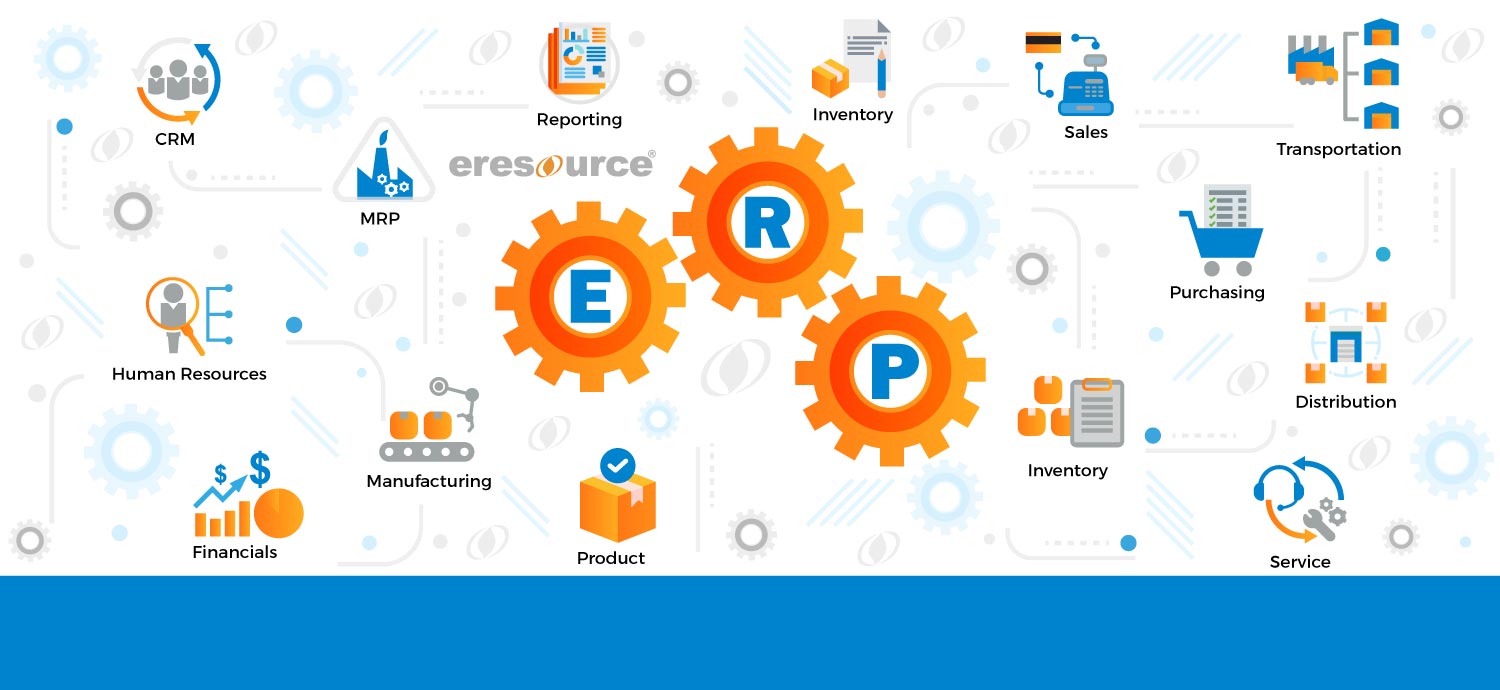eresource ERP for Manufacturing is a Global Business :
Speed of information flow has made manufacturing a global business. Coupled with advertising, the ability to move information at the speed of light has opened up all corners of the globe to makers of all products.
The computer has changed the way we conduct our businesses. It has also allowed small companies to become giants in their industries by giving them the greatest. Mid-sized companies have access to the same quality of information as the giants in their fields. The question is no longer, where can I get the information I need? The question is now, what do I do with all the information I have?
There are many computer programs designed to convert data into information, usually for a specific purpose or function. Shop floor workers need one level of information, in real-time, about the process or production; executives need a different view of that data for long-range planning and short-term deployment. Same data; different information.
Data mining and data warehousing applications involve this aspect of information development. Databases are becoming larger and larger as companies find more and more data to store.
Answering that call, software developers have looked for ways to bring many divergent requirements under a single, if huge, umbrella program called enterprise resource planning or ERP. What ERP strives to do is combine the needed functions of every application a company requires to do its job and integrate them all together.
Also Read – Best Trading ERP Software
ERP allows companies to balance customer demands impacted by multiple interrelated items and multiple plant locations. ERP adds applications for financials, supply chain, and distribution and requirements planning for multiple sites. It facilitates intelligent resource planning in the face of rapidly changing constraints such as materials availability, market readiness, plant capacities, personnel certification and business costs per location. In short ERP systems will allow decision makers to champion ‘an intelligent, agile and responsive organization in the global marketplace of the next century.’
In modern manufacturing operations, information starts at the top and the bottom simultaneously. Data originates at the machines, the process and the workers. It indicates what is being made, how and where, when it will be done, and why it won’t be on time.
ERP also can make a difference at the shipping and distribution end of a company. Shipments can go direct, and are therefore smaller and cheaper. In addition, there’s no need to stock materials or finished units, so stocks don’t become obsolete and have to be written off.
Even before the manufacturing operation gets involved, information is necessary, such as in the sales effort. As the pace of the typical sales cycle increases and the ability to access more information increases, information systems must be able to keep pace and even improve the process. The most valuable information to our overseas people is product and customer information.
It is exceedingly important for all sales people to have a complete view of all activity that occurs with a customer. This would typically include sales history, but now must include trouble calls, service requests, repairs and any other activity from general questions to product inquiries.
ERP is not confined within the walls of a single entity. With the web-enabled ERP such as eresource ERP, data flows go out to suppliers and vendors, customers and prospects. What you find out can be shared with another person or even millions of people at the same time you learn it yourself. Design and product development can be a collaborative process without barriers of space and time. Groupware, data management and communications combine to allow everyone to sit in the same office, regardless of where they are physically located.
eresource Infotech’s web-based ERP and its e-mail alert capabilities have exploded onto the scene as mandatory business requirements. It has helped even the playing field to a point where the size of a company is far less apparent and in some cases unimportant. The Web-based ERP offers a great resource and network capability that allows to puts more product information and customer service information in the hands of customer.
The organization can also offer direct ordering of products and services and traditional order management services through the Web-based ERP Software Solution and improve the customer interaction. This should ultimately lessen the cost per order and allows the organization to focus more on customer grievances and less on traditional tasks.
Thanks to the emergence of cutting-edge global IT solutions such as ERP, manufacturers have a better-than-ever chance of keeping up with the increasing demands their customers are putting on them.
Also Read – ERP for Plastic Manufacturing Industry
Categories
Register for Free Demo!
Recent Post
-

eresource ERP 360 - an
11th Apr 2019 -

A competitive ERP system for
17th Apr 2019 -

Auto components manufacturing industry has
17th Apr 2019 -

Make the best use of
17th Apr 2019







